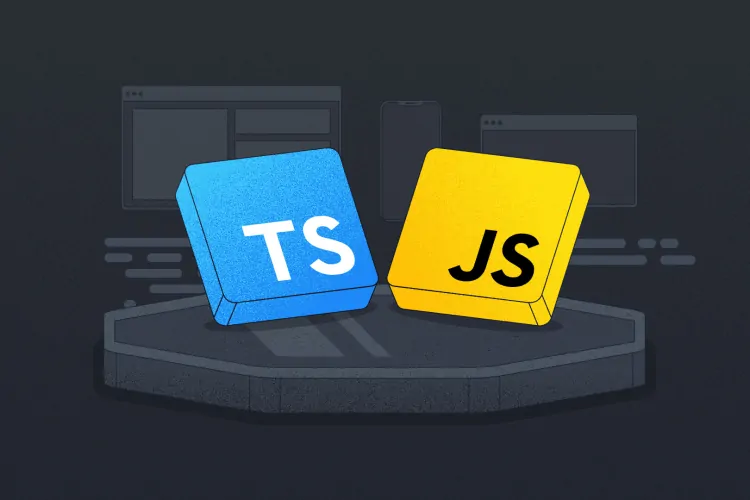Why TypeScript Is Becoming the Go-To Tool for JavaScript Programmers
Discover why TypeScript is the preferred choice for JavaScript programmers. Learn how it enhances code quality, scalability, and developer productivity in modern projects.

JavaScript has been a cornerstone of web development for decades, powering dynamic and interactive experiences on the internet. While JavaScript is versatile and widely adopted, its dynamic nature often leads to challenges in large-scale application development. Enter TypeScript: a superset of JavaScript that adds static typing and other features to make coding more efficient and less error-prone. This article explores why TypeScript is rapidly becoming the preferred choice for JavaScript developers and how it benefits JavaScript programmer for hire projects. We will also touch on its relevance in the context of IT projects outsourcing.
What Is TypeScript?
TypeScript is an open-source programming language developed by Microsoft. It extends JavaScript by introducing static typing, interfaces, and other features typically found in strongly-typed languages like Java or C#. TypeScript compiles to plain JavaScript, ensuring compatibility with existing JavaScript environments.
Key Features of TypeScript
-
Static Typing: Developers can specify data types for variables, reducing runtime errors.
-
Enhanced IDE Support: Features like auto-completion and code refactoring improve developer productivity.
-
Modular Design: TypeScript’s interface and module system simplify the management of complex codebases.
-
Backward Compatibility: TypeScript is compatible with all JavaScript libraries and frameworks.
-
Rich Tooling Ecosystem: Developers can leverage powerful tools like TSLint and TypeScript Compiler (TSC).
Why Developers Are Choosing TypeScript
1. Improved Code Quality and Maintainability
TypeScript’s static typing catches errors at compile time rather than runtime. For large-scale projects, this feature is invaluable as it ensures better maintainability and reduces debugging efforts. Businesses looking for a JavaScript programmer for hire often prefer candidates skilled in TypeScript due to its ability to produce cleaner, more reliable code.
2. Seamless Integration with Modern Frameworks
Popular frameworks like Angular, React, and Vue.js support TypeScript out of the box. This compatibility has contributed significantly to TypeScript’s adoption among front-end and back-end developers alike.
-
Angular: Built with TypeScript at its core, Angular fully utilizes its typing and modular features.
-
React: TypeScript integrates seamlessly with React through libraries like
@types/react, providing better type definitions. -
Vue.js: The Vue 3 ecosystem offers official TypeScript support, making it easier for developers to build scalable applications.
3. Scalability for Enterprise Applications
TypeScript’s robust tooling and static typing make it a preferred choice for enterprise-grade applications. Teams working on large codebases can maintain consistency and avoid issues caused by loosely-typed variables. Companies involved in IT projects outsourcing often insist on TypeScript for enterprise software development because it ensures scalability and reduces long-term maintenance costs.
4. Enhanced Developer Experience
The tooling ecosystem around TypeScript significantly enhances the developer experience. Features such as intelligent code completion, inline documentation, and error highlighting save time and reduce frustration during development. Teams offering JavaScript programmer for hire services often highlight their proficiency in TypeScript to attract clients who prioritize productivity.
5. Growing Community and Ecosystem
TypeScript boasts a vibrant community and an ever-expanding ecosystem of tools, libraries, and resources. The regular updates and contributions from Microsoft ensure that TypeScript remains relevant and up-to-date with the latest JavaScript standards.
TypeScript in Action: Use Cases
1. Web Development
From simple websites to complex Single Page Applications (SPAs), TypeScript has proven its utility. It enhances code readability and reduces bugs, ensuring smoother user experiences.
2. Back-End Development
TypeScript is increasingly used with Node.js for server-side programming. Its ability to handle complex data types and asynchronous operations makes it ideal for creating scalable APIs and microservices.
3. Mobile Application Development
Frameworks like React Native support TypeScript, allowing developers to create robust mobile applications with fewer errors and better maintainability.
4. Cloud and DevOps Applications
TypeScript’s static typing is highly beneficial for developing cloud-native applications and DevOps tools, where reliability is critical.
Benefits for Businesses
1. Reduced Development Costs
Static typing reduces bugs and makes debugging faster, saving businesses significant costs over the lifecycle of a project. For companies investing in IT projects outsourcing, this means getting more reliable deliverables.
2. Faster Time to Market
TypeScript’s rich tooling accelerates development workflows, enabling teams to deliver high-quality products faster.
3. Future-Proof Applications
TypeScript ensures that codebases are well-structured and easy to scale, making them better suited for future enhancements and integrations.
4. Improved Collaboration
Static typing and clear interfaces make it easier for teams to collaborate, especially in distributed environments common in IT projects outsourcing scenarios.
Challenges and Considerations
While TypeScript offers numerous advantages, there are some challenges to consider:
-
Learning Curve: Developers familiar with JavaScript may need time to adapt to TypeScript’s stricter syntax and features.
-
Initial Setup: Setting up TypeScript in existing projects can be time-consuming, especially for large legacy codebases.
-
Compilation Overhead: TypeScript requires compilation into JavaScript, which adds an extra step in the development process.
Despite these challenges, the long-term benefits of adopting TypeScript often outweigh the initial investment.
How to Transition to TypeScript
-
Start Small: Begin by converting smaller modules or components to TypeScript.
-
Leverage Tools: Use tools like TSLint and TypeScript Compiler to streamline the migration process.
-
Provide Training: Invest in training your development team to familiarize them with TypeScript’s features and best practices.
-
Hire Experts: Consider hiring a JavaScript programmer for hire who is proficient in TypeScript to guide the transition process.
Conclusion
TypeScript is reshaping the way developers approach JavaScript programming by offering features that enhance code quality, scalability, and maintainability. Its seamless integration with modern frameworks, robust tooling, and ability to address JavaScript’s shortcomings make it a compelling choice for businesses and developers alike.
Whether you are looking for a JavaScript programmer for hire to strengthen your team or planning to leverage IT projects outsourcing for your next software endeavor, TypeScript’s advantages cannot be overlooked. Embracing TypeScript today is an investment in building more reliable and future-proof applications tomorrow.
What's Your Reaction?















